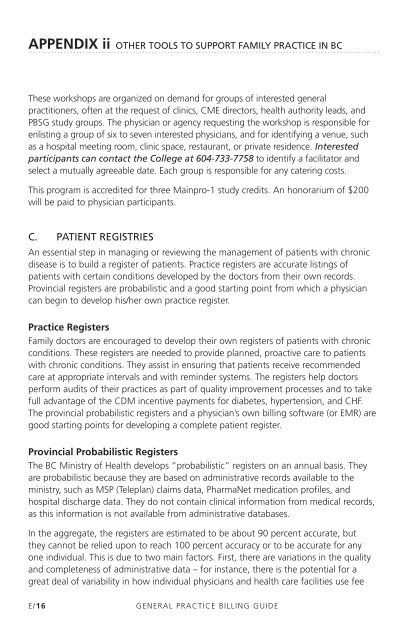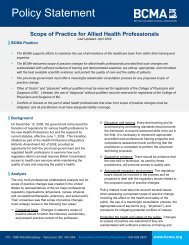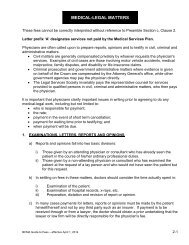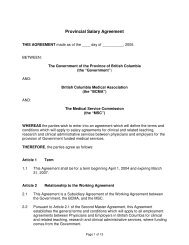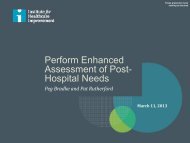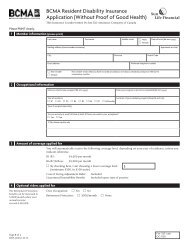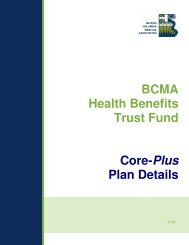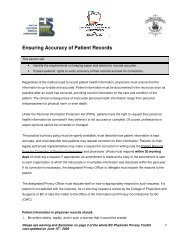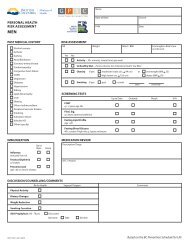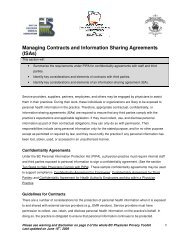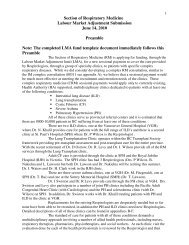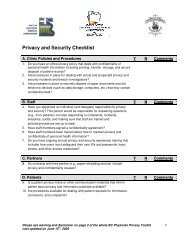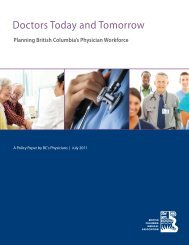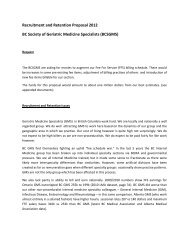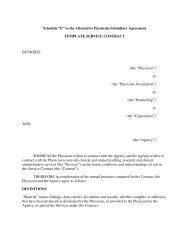General Practice BILLING GUIDE - British Columbia Medical ...
General Practice BILLING GUIDE - British Columbia Medical ...
General Practice BILLING GUIDE - British Columbia Medical ...
You also want an ePaper? Increase the reach of your titles
YUMPU automatically turns print PDFs into web optimized ePapers that Google loves.
APPENDIX ii OTHER TOOLS TO SUPPORT FAMILY PRACTICE IN BC<br />
These workshops are organized on demand for groups of interested general<br />
practitioners, often at the request of clinics, CME directors, health authority leads, and<br />
PBSG study groups. The physician or agency requesting the workshop is responsible for<br />
enlisting a group of six to seven interested physicians, and for identifying a venue, such<br />
as a hospital meeting room, clinic space, restaurant, or private residence. Interested<br />
participants can contact the College at 604-733-7758 to identify a facilitator and<br />
select a mutually agreeable date. Each group is responsible for any catering costs.<br />
This program is accredited for three Mainpro-1 study credits. An honorarium of $200<br />
will be paid to physician participants.<br />
C. PATIENT REGISTRIES<br />
An essential step in managing or reviewing the management of patients with chronic<br />
disease is to build a register of patients. <strong>Practice</strong> registers are accurate listings of<br />
patients with certain conditions developed by the doctors from their own records.<br />
Provincial registers are probabilistic and a good starting point from which a physician<br />
can begin to develop his/her own practice register.<br />
<strong>Practice</strong> Registers<br />
Family doctors are encouraged to develop their own registers of patients with chronic<br />
conditions. These registers are needed to provide planned, proactive care to patients<br />
with chronic conditions. They assist in ensuring that patients receive recommended<br />
care at appropriate intervals and with reminder systems. The registers help doctors<br />
perform audits of their practices as part of quality improvement processes and to take<br />
full advantage of the CDM incentive payments for diabetes, hypertension, and CHF.<br />
The provincial probabilistic registers and a physician’s own billing software (or EMR) are<br />
good starting points for developing a complete patient register.<br />
Provincial Probabilistic Registers<br />
The BC Ministry of Health develops “probabilistic” registers on an annual basis. They<br />
are probabilistic because they are based on administrative records available to the<br />
ministry, such as MSP (Teleplan) claims data, PharmaNet medication profiles, and<br />
hospital discharge data. They do not contain clinical information from medical records,<br />
as this information is not available from administrative databases.<br />
In the aggregate, the registers are estimated to be about 90 percent accurate, but<br />
they cannot be relied upon to reach 100 percent accuracy or to be accurate for any<br />
one individual. This is due to two main factors. First, there are variations in the quality<br />
and completeness of administrative data – for instance, there is the potential for a<br />
great deal of variability in how individual physicians and health care facilities use fee<br />
E/16<br />
GENERAL PRACTICE <strong>BILLING</strong> <strong>GUIDE</strong>


